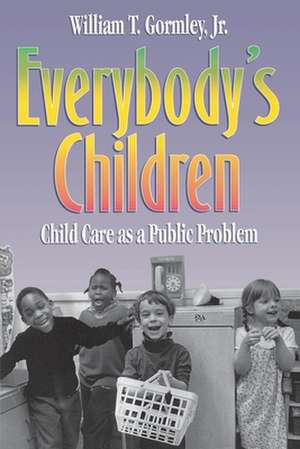Everybody's Children: Child Care as a Public Problem
Autor William T. Gormleyen Limba Engleză Paperback – aug 1995
Nearly two-thirds of American women with children under age six are in the labor force. It should be no surprise that child care is one of the most serious and widespread concerns of parents today. They worry constantly, wondering if they can afford a particular arrangement, dreading that their favorite provider will quit, and, mostly, questioning whether or not they're doing the best they can for their children. Although these concerns are usually considered a private headache, William Gormley argues that child care is a social problem of critical importance, aggravated by weak institutional supports, and that there are compelling reasons for government intervention.
In this important new book, Gormley offers a balanced and comprehensive analysis of the market, government, and societal failures to ensure available, affordable, high-quality child care in the United States. Unreliable child care, he says, contributes to family stress and undermines efforts to achieve educational readiness, welfare reform, and gender equity. Neither regulators nor family support agencies distinguish sharply enough between good and bad child care facilities. Meanwhile, government and businesses provide inadequate financial and logistical support. Children suffer as a result, as does society as a whole.
Gormley presents evidence on how different states and communities have responded to child care challenges and he prescribes the roles to be played by federal, state, and local governments, for-profit and non-profit child care providers, churches, schools, and family support agencies. Gormley recommends a number of reforms, including information sharing, flexible enforcement, targeted subsidies, and family-friendly workplaces. He contends that different levels of government and societal institutions must work together to achieve the goals of efficiency, justice, choice, discretion, coordination, and responsiveness.
In this important new book, Gormley offers a balanced and comprehensive analysis of the market, government, and societal failures to ensure available, affordable, high-quality child care in the United States. Unreliable child care, he says, contributes to family stress and undermines efforts to achieve educational readiness, welfare reform, and gender equity. Neither regulators nor family support agencies distinguish sharply enough between good and bad child care facilities. Meanwhile, government and businesses provide inadequate financial and logistical support. Children suffer as a result, as does society as a whole.
Gormley presents evidence on how different states and communities have responded to child care challenges and he prescribes the roles to be played by federal, state, and local governments, for-profit and non-profit child care providers, churches, schools, and family support agencies. Gormley recommends a number of reforms, including information sharing, flexible enforcement, targeted subsidies, and family-friendly workplaces. He contends that different levels of government and societal institutions must work together to achieve the goals of efficiency, justice, choice, discretion, coordination, and responsiveness.
Preț: 199.11 lei
Nou
Puncte Express: 299
Preț estimativ în valută:
38.10€ • 40.74$ • 31.77£
38.10€ • 40.74$ • 31.77£
Carte tipărită la comandă
Livrare economică 17 aprilie-01 mai
Preluare comenzi: 021 569.72.76
Specificații
ISBN-13: 9780815732235
ISBN-10: 0815732236
Pagini: 260
Ilustrații: Illustrations
Dimensiuni: 152 x 229 x 18 mm
Greutate: 0.35 kg
Ediția:New.
Editura: Brookings Institution Press
Colecția Brookings Institution Press
ISBN-10: 0815732236
Pagini: 260
Ilustrații: Illustrations
Dimensiuni: 152 x 229 x 18 mm
Greutate: 0.35 kg
Ediția:New.
Editura: Brookings Institution Press
Colecția Brookings Institution Press
Notă biografică
William T. Gormley Jr. is University Professor and professor of government and public policy at Georgetown University. He is the author of several books, including Organizational Report Cards, with David Weimer.
Descriere
Nearly two-thirds of American women with children under age six are in the labor force. It should be no surprise that child care is one of the most serious and widespread concerns of parents today. They worry constantly, wondering if they can afford a particular arrangement, dreading that their favorite provider will quit, and, mostly, questioning whether or not they're doing the best they can for their children. Although these concerns are usually considered a private headache, William Gormley argues that child care is a social problem of critical importance, aggravated by weak institutional supports, and that there are compelling reasons for government intervention.
In this important new book, Gormley offers a balanced and comprehensive analysis of the market, government, and societal failures to ensure available, affordable, high-quality child care in the United States. Unreliable child care, he says, contributes to family stress and undermines efforts to achieve educational readiness, welfare reform, and gender equity. Neither regulators nor family support agencies distinguish sharply enough between good and bad child care facilities. Meanwhile, government and businesses provide inadequate financial and logistical support. Children suffer as a result, as does society as a whole.
Gormley presents evidence on how different states and communities have responded to child care challenges and he prescribes the roles to be played by federal, state, and local governments, for-profit and non-profit child care providers, churches, schools, and family support agencies. Gormley recommends a number of reforms, including information sharing, flexible enforcement, targeted subsidies, and family-friendly workplaces. He contends that different levels of government and societal institutions must work together to achieve the goals of efficiency, justice, choice, discretion, coordination, and responsiveness.
In this important new book, Gormley offers a balanced and comprehensive analysis of the market, government, and societal failures to ensure available, affordable, high-quality child care in the United States. Unreliable child care, he says, contributes to family stress and undermines efforts to achieve educational readiness, welfare reform, and gender equity. Neither regulators nor family support agencies distinguish sharply enough between good and bad child care facilities. Meanwhile, government and businesses provide inadequate financial and logistical support. Children suffer as a result, as does society as a whole.
Gormley presents evidence on how different states and communities have responded to child care challenges and he prescribes the roles to be played by federal, state, and local governments, for-profit and non-profit child care providers, churches, schools, and family support agencies. Gormley recommends a number of reforms, including information sharing, flexible enforcement, targeted subsidies, and family-friendly workplaces. He contends that different levels of government and societal institutions must work together to achieve the goals of efficiency, justice, choice, discretion, coordination, and responsiveness.


















